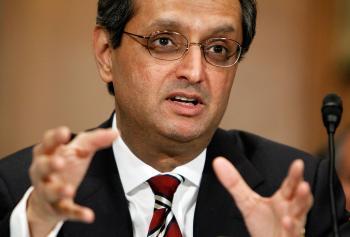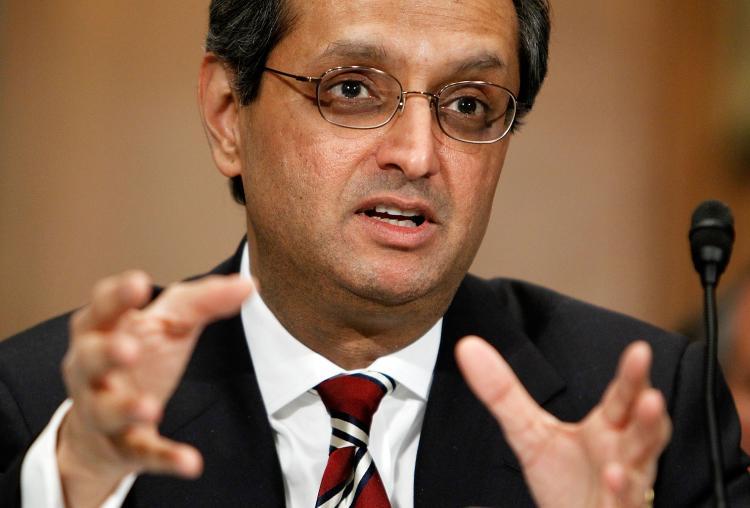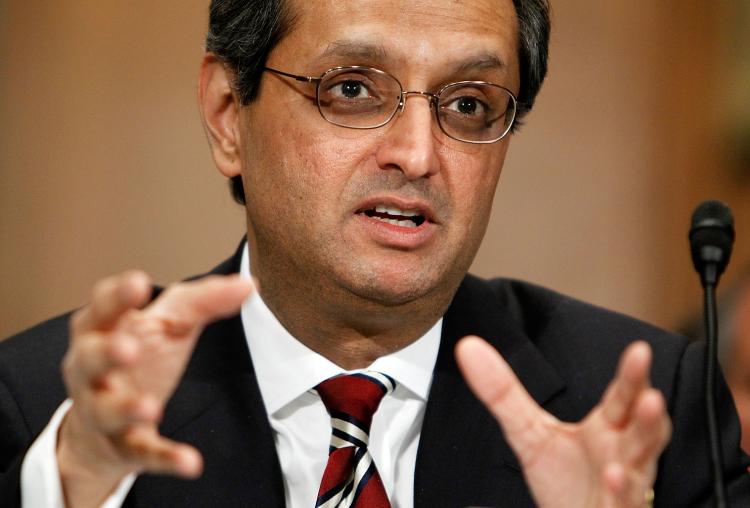NEW YORK—You wouldn’t be able to tell last Friday that the nation’s three biggest banks enjoyed solid second-quarter earnings, with financial stocks leading a massive selloff that sent the Dow Jones Industrial Average tumbling 261 points.
Last Friday, two of the country’s largest banks—Citigroup Inc. and Bank of America Corp.—posted better than expected second-quarter profits. With JPMorgan Chase & Co.’s solid report last Thursday, the nation’s top three banks are in a much better position than they were a year ago.
Citigroup, the last major bank to shed its TARP bailout loan, reported $2.7 billion in second-quarter earnings, beating Wall Street expectations. Its $0.09 in earnings per share was almost double analyst expectations of $0.05 per share.
Charlotte, N.C.-based Bank of America, the nation’s largest bank, reported profits of $3.1 billion, or 27 cents per share. Its results also exceeded analyst expectations of 22 cents per share.
Pessimistic Outlook
Normally, such optimistic figures would inspire a stock market rally, but last Friday, the banks led the charge in the market plummet. The Dow lost 2.5 percent, the broader S&P 500 Index shed 2.9 percent, and Nasdaq Composite lost 3.1 percent.
Investors soured on the banks mainly due to disappointing trading gains, which comes from the bank’s capital market operations of buying and selling securities, traditionally a highly lucrative business that propelled the banking industry’s earnings during the past year.
Trading operations were hurt by the European debt crisis and foreign currency risk of a slumping euro. Citigroup’s stock slipped 4 percent last Friday, while Bank of America’s shares declined more than 9 percent.
Investors were also troubled by growth prospects at the nation’s biggest banks—all three have large consumer businesses such as mortgages and credit cards.
Economists look at the current unemployment rate and see that demand for mortgage refinancings and new mortgages will almost certainly slow. In addition, the newly passed consumer financial protection bill will likely weigh on the banks’ bottom lines.
“Everyone’s sitting on the sidelines,” said Citigroup Chief Financial Officer John Gerspach, regarding new loan activity on a conference call with analysts last Friday. “I don’t see a great deal of demand in the near term, at least until this uncertainty is removed.”
The financial overhaul, which eliminates certain overdraft fees, puts caps on credit card interest rates, as well as a slew of other fees that banks typically charged to unsuspecting consumers. Bank of America estimated that total cost of adopting the new regulations could cost $10 billion.
Citigroup and JPMorgan management have not come up with an expected impact of the financial overhaul bill, which is in its early stages of implementation.
Citigroup doesn’t believe that the bill would hurt its bottom line. The bank has major operations outside of the United States and has a comparatively smaller U.S. consumer business compared to its rivals Bank of America and JPMorgan Chase.
“Our overdraft revenues are not material for us as we generally did not allow our debit cardholders to overdraft their accounts in the first place,” said Citigroup CEO Vikram S. Pandit on the conference call.
Smaller Loan Losses
A major positive for all three banks—one that has been underreported—is that all three reported smaller loan losses. Their customers are having an easier time paying mortgages and credit card bills.
This is good news for banks, consumers, and the federal government.
“Net credit losses of $8 billion improved for the fourth consecutive quarter and we recorded a net loan loss reserve release of $1.5 billion pretax, as credit continued to improve,” said Citigroup’s Gerspach in the Citigroup call.
The nation’s fourth largest bank, Wells Fargo, will report earnings on Wednesday. Goldman Sachs Group Inc. and Morgan Stanley & Co. will also report this week.
Last Friday, two of the country’s largest banks—Citigroup Inc. and Bank of America Corp.—posted better than expected second-quarter profits. With JPMorgan Chase & Co.’s solid report last Thursday, the nation’s top three banks are in a much better position than they were a year ago.
Citigroup, the last major bank to shed its TARP bailout loan, reported $2.7 billion in second-quarter earnings, beating Wall Street expectations. Its $0.09 in earnings per share was almost double analyst expectations of $0.05 per share.
Charlotte, N.C.-based Bank of America, the nation’s largest bank, reported profits of $3.1 billion, or 27 cents per share. Its results also exceeded analyst expectations of 22 cents per share.
Pessimistic Outlook
Normally, such optimistic figures would inspire a stock market rally, but last Friday, the banks led the charge in the market plummet. The Dow lost 2.5 percent, the broader S&P 500 Index shed 2.9 percent, and Nasdaq Composite lost 3.1 percent.
Investors soured on the banks mainly due to disappointing trading gains, which comes from the bank’s capital market operations of buying and selling securities, traditionally a highly lucrative business that propelled the banking industry’s earnings during the past year.
Trading operations were hurt by the European debt crisis and foreign currency risk of a slumping euro. Citigroup’s stock slipped 4 percent last Friday, while Bank of America’s shares declined more than 9 percent.
Investors were also troubled by growth prospects at the nation’s biggest banks—all three have large consumer businesses such as mortgages and credit cards.
Economists look at the current unemployment rate and see that demand for mortgage refinancings and new mortgages will almost certainly slow. In addition, the newly passed consumer financial protection bill will likely weigh on the banks’ bottom lines.
“Everyone’s sitting on the sidelines,” said Citigroup Chief Financial Officer John Gerspach, regarding new loan activity on a conference call with analysts last Friday. “I don’t see a great deal of demand in the near term, at least until this uncertainty is removed.”
The financial overhaul, which eliminates certain overdraft fees, puts caps on credit card interest rates, as well as a slew of other fees that banks typically charged to unsuspecting consumers. Bank of America estimated that total cost of adopting the new regulations could cost $10 billion.
Citigroup and JPMorgan management have not come up with an expected impact of the financial overhaul bill, which is in its early stages of implementation.
Citigroup doesn’t believe that the bill would hurt its bottom line. The bank has major operations outside of the United States and has a comparatively smaller U.S. consumer business compared to its rivals Bank of America and JPMorgan Chase.
“Our overdraft revenues are not material for us as we generally did not allow our debit cardholders to overdraft their accounts in the first place,” said Citigroup CEO Vikram S. Pandit on the conference call.
Smaller Loan Losses
A major positive for all three banks—one that has been underreported—is that all three reported smaller loan losses. Their customers are having an easier time paying mortgages and credit card bills.
This is good news for banks, consumers, and the federal government.
“Net credit losses of $8 billion improved for the fourth consecutive quarter and we recorded a net loan loss reserve release of $1.5 billion pretax, as credit continued to improve,” said Citigroup’s Gerspach in the Citigroup call.
The nation’s fourth largest bank, Wells Fargo, will report earnings on Wednesday. Goldman Sachs Group Inc. and Morgan Stanley & Co. will also report this week.






